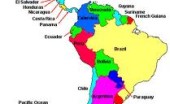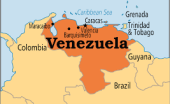Molly Minturn - My family is heartbroken to share that my father died in surgery on Monday, Feb. 10. It…
Cuba
Written by Diana Thebaud Nicholson // April 20, 2009 // Americas, Geopolitics // Comments Off on Cuba
Cuba, Obama elbow economic crisis off summit stage
(WaPost) PORT-OF-SPAIN, Trinidad — Millions of Latin Americans may be falling into poverty this year as a result of the financial crisis but it was politics, not economics, that dominated the stage at this weekend’s Summit of the Americas in Trinidad and Tobago, with two friendly meetings between Hugo Chavez and Barack Obama stealing the spotlight.
(FP Morning Brief) Obama is defending his cordial treatment of the Venezuelan leader from critics in the U.S., though the exchange seems to have gone over well with other Latin American leaders. Chavez also approached Secretary of State Hillary Clinton about the possibility of returning ambassadors to their posts in Caracas and Washington.
Obama finished the summit with a news conference in which called for U.S. relations with Latin America to address areas other than drug interdiction. “If our only interaction is military, then we may not be developing the connections that can, over time, increase our influence,” he said. Obama acknowledged that the U.S. embargo on Cuba has not been effective at bringing democracy to that country, though economic advisor Larry Summers cautioned that an end to the embargo is “way down the road.”
18 April
Cuba issue divides Americas summit
Several leaders at the Summit of the Americas are unlikely to sign the final declaration due to disagreements on the global economy and Cuba. Venezuela, Nicaragua, Honduras, Dominica and Bolivia all said on Saturday that they would not agree to the final commitments, Al Jazeera’s Dima Khatib reported. Al Jazeera
(RCI) As leaders who will participate in this weekend’s Summit of the Americas gather in Port-of-Spain, the issue that may dominate the discussion may be one that isn’t on the official agenda, the possible readmission of Cuba to the Organization of American States. Cuba was expelled from the OAS chiefly at the behest of the U.S. 57 years ago on the grounds that its Communist system was incompatible with the organization’s principles. Both Cuba and the U.S. seem to be inching toward reconciliation. Earlier in the week, U.S. President Barack Obama relaxed some restrictions on American money transfers and travel to the island. On Thursday, U.S. Secretary of State Hillary Clinton acknowledged that the decades-old U.S. economic boycott of Cuba aimed at forcing the downfall of its régime is a failure. Also on Thursday speaking at a meeting of leftist leaders in Venezuela, Cuban President Raul Castro said that Cuba would never wish to join the OAS, which should “disappear.” But he also said he is ready to talk with the Americans with all issues on the table, even human rights and political prisoners.
17 April
Obama Calls for Thaw in U.S. Relations With Cuba
(NYT) Mr. Obama’s remarks, during the opening ceremony at the Summit of the Americas, are the clearest signal in decades that the United States is willing to change direction in its dealings with Cuba. They capped a dizzying series of developments this week, including surprisingly warm words between Raúl Castro, Cuba’s leader, and Secretary of State Hillary Rodham Clinton.
(The Economist) Raúl Castro, Cuba’s leader, appears to welcome talks with America on political freedoms
13 April
Obama Opens Door to Cuba, but Only a Crack
The shifts in policy cover three main areas: family travel, remittances and telecommunications. White House Fact Sheet
Beneath the U.S. Obsession With Cuba
By George Friedman
(Stratfor) The Cuban American National Foundation (CANF), a group vehemently opposed to the Cuban government, came out in favor of easing the U.S. isolation of Cuba last week. The move opens the possibility that the United States might shift its policies toward Cuba. Florida is a key state for anyone who wants to become president of the United States, and the Cuban community in Florida is substantial. Though the Soviet threat expired long ago, easing the embargo on Cuba has always held limited value to American politicians with ambitions. For them, Florida is more important than Cuba. Therefore, this historic shift alters the U.S. domestic political landscape.
2008
31 December
Timeline: US-Cuba relations
The US has long sought the end of President Fidel Castro’s regime and has had an economic embargo in place against Cuba since 1960. BBC News tracks the rocky relationship between the two countries.
4 March 2009
Fidel Castro
Fidel Castro, Cuba’s fiery revolutionary patriarch and an international icon of rebellion, resigned as president on Feb. 19, 2008, in a letter in La Granma, the state run newspaper in Cuba. “I will not aspire nor accept — I repeat I will not aspire or accept, the post of President of the Council of State and Commander in Chief,” he wrote.
Mr. Castro became ill in 2006, underwent surgery and has not been seen in public since then. Questions persist about his recovery and he has looked gaunt in photographs.
27 January 2007
Cuba’s Revolution Now Under Two Masters
By JAMES C. McKINLEY Jr.
This year, for the first time, it was Fidel Castro’s younger brother, Raúl, the acting president, who gave the annual revolutionary speech at the anniversary celebration.



